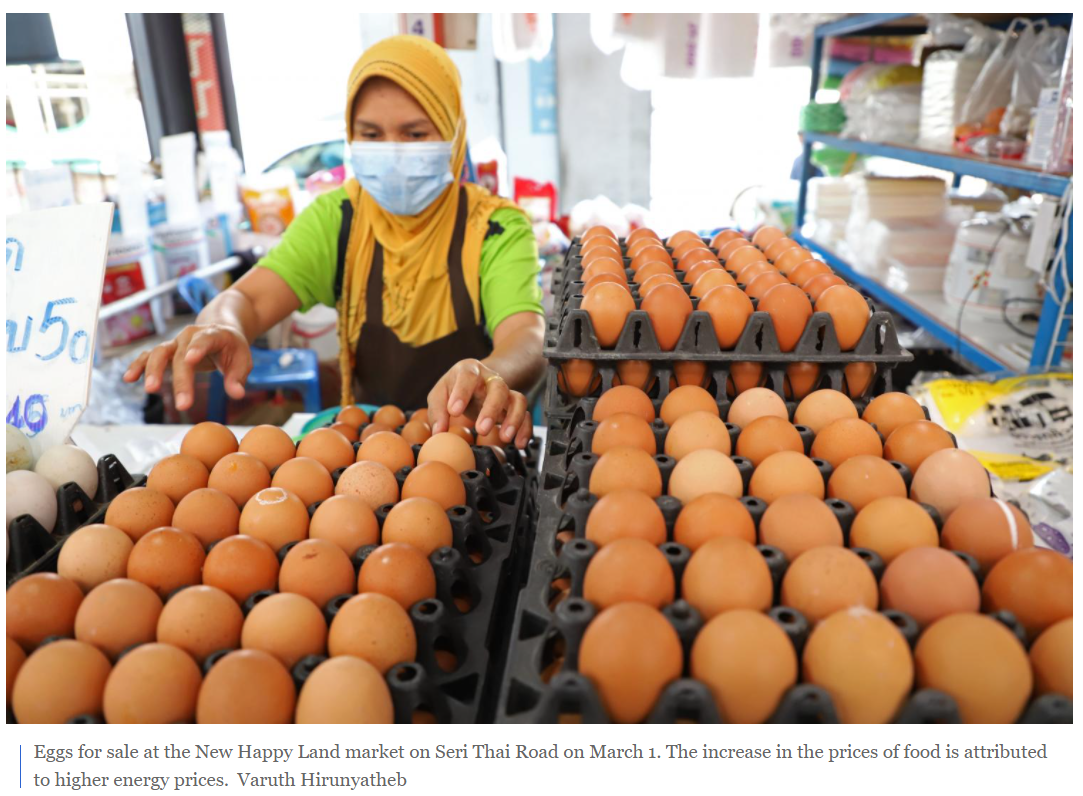Thailand: Exploring factors driving the inflation uptick
The Commerce Ministry recently announced Thailand’s headline inflation rate rose 5.28% in February year-on-year, which was higher than expected. The surge in the economic indicator marked the fastest rate jump in 13 years and breaches the central bank inflation target for this year.
What are the factors triggering Thailand’s high inflation rate?
The Commerce Ministry attributed key triggers driving up the inflation rate as rising energy and food prices.
Energy prices, including electricity and fuel, rose to 29.2% of the figure used to determine inflation from 19.2% in February year-on-year. At the same time, food prices such as meat, eggs, vegetables and non-alcoholic beverages increased to 4.51% from 2.39% over the same period.
Somkiat Kimawaha, senior vice-president of the Bank for Agriculture and Agricultural Cooperatives, said the prices of certain agricultural and farm products increased last month.
These include jasmine rice (up 0.5-3.54%), palm oil (up 3.12-8.41%), rubber sheets (up 0.18-2.28%), and live pigs (up 0.13-1.15%).
Ronnarong Phoolpipat, director-general of Trade Policy and Strategy Office (TPSO), said inflation prospects for March are grim.
“Headline inflation in March 2022 will remain at a high level following a rise in energy prices [fuel and electricity] when compared with the previous year. This will increase prices of consumer goods including prepared food, seasonings and condiments,” said Mr Ronnarong.
“Inflation this year is likely to be volatile, and the projection will be revised sometime this month.”
Meanwhile, core inflation, which strips out raw food and energy prices, rose 1.8% in February year-on-year.
How is consumer sentiment in Thailand?
According to the TPSO report, the overall Consumer Confidence Index, which reflects consumer attitudes about the economy, remained at 44.6 in February, holding steady to the previous month. A number under 50 indicates negative sentiment.
The top five consumer worries stem from: the state of the Thai economy (36.6%), the pandemic situation (26.4%), the government’s policies and measures (12.2%), political stability (5.95%) and prices of agricultural products (5.48%).
Thanavath Phonvichai, president of the University of the Thai Chamber of Commerce, said Thai wallets will continue to bear the brunt.
“Consumers will be affected by the higher cost of living and become more cautious with their spending. This will aggravate the economy, which is already suffering from Covid-19 outbreaks. The Thai economy will not recover easily this year,” Mr Thanavath said.
Government spokesman Thanakorn Wangboonkongchana said at a press conference last Thursday the country’s GDP growth is still projected to be 3.5-4% this year, as the National Economic and Social Development Council previously forecast.
What did the Bank of Thailand say about inflation and interest rates?
The Bank of Thailand recently expressed concern about inflation and said it would monitor the ongoing conflict in Ukraine.
Chayawadee Chai-Anant, the central bank’s senior director, said the Thai economy could face a higher inflation rate with higher global energy prices because Russia and Ukraine are major producers of commodities and gas.
She said the forecast of rising inflation in the first half of this year for Thailand is in line with spiking global prices caused by the impact of Covid-19.
Nonetheless, the February inflation rate of 5.28% and the January rate of 3.23% both breached the top end of the central bank’s 2022 target headline inflation range of 1% to 3%.
As for its key interest rate, the central bank left it unchanged at a record low of 0.50% in February. The bank said it wanted to maintain support for a fragile economic recovery amid efforts to revive the country’s battered tourism sector and rising inflation risks that have breached its target range.
The Bank of Thailand’s rate-setting committee is set to meet next on March 31.
What are the government measures to tame inflation?
Prime Minister Prayut Chan-o-cha on Monday urged the public to cut back on energy consumption.
“We’re urging everyone to help save energy as much as possible, especially using private cars,” Gen Prayut said.
“We’ve already taken steps to address the rising prices, but what should we do if they continue when we have a limited budget?”
Mr Thanakorn, the government spokesman, also chimed in on the issue.
“The challenges facing Thailand and other countries — the Covid-19 pandemic, global inflation and the Ukraine-Russia war — are unprecedented and are driving fuel prices and affecting the costs of transport and consumer goods,” he said.
In mid-February, the cabinet agreed to cut the excise tax on diesel by three baht per litre from 5.99 baht for three months (until May 20) to help ease the impact of high energy prices on the cost of transport and consumer goods amid the crisis in Ukraine.
Furthermore, Deputy Prime Minister Jurin Laksanawisit said all ministries are working to propose solutions that can effectively dampen rising costs and spare producers and consumers from the potential economic fallout.
Mr Jurin said the government would continue its strict price control policy on 18 groups of essential consumer staples regardless of fluctuations in market prices and the situation in Ukraine. He gave an example of the average price of pork being capped at 150 baht per kilogramme.
Source: https://www.bangkokpost.com/business/2276203/exploring-factors-driving-the-inflation-uptick


 Thailand
Thailand




